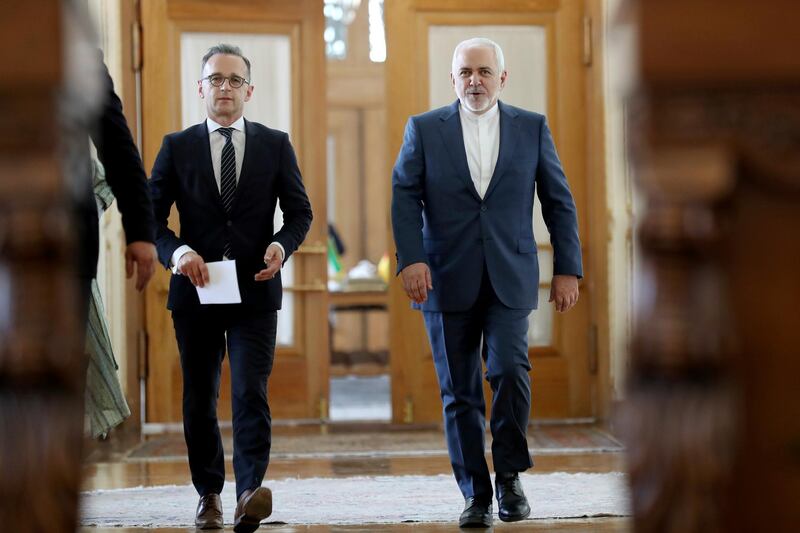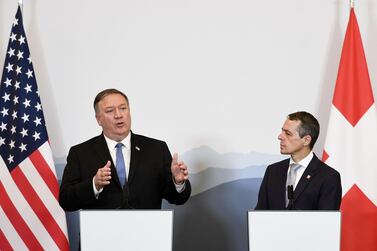The US cannot expect to remain safe while waging an "economic war" against Iran through sanctions, Foreign Minister Mohammad Javad Zarif said on Monday after talks in Tehran with his German counterpart.
"One cannot expect an economic war to continue against the Iranian people and that those waging this war and those supporting it remain safe," Mr Zarif said at a news conference in Tehran with German Foreign Minister Heiko Maas.
"The only way to decrease tensions in the region is to stop the economic war," he said, noting that Germany and the European Union could have an "important role" to play in defusing the situation.
Mr Maas said his country would do its utmost to ensure tensions do not escalate.
"There is war in Syria and in Yemen, fortunately not here," he said. "We want to do everything we can to keep it that way" for Iran.
"Nevertheless, the tensions here in the region are worrying, and we fear that single events can trigger developments that end in violence, and we want to prevent this under all circumstances."
Mr Maas visited Tehran after stops in Iraq, Jordan and the UAE as part of a regional tour aimed at defusing tensions arising from US President Donald Trump's decision over a year ago to withdraw America from Iran's 2015 nuclear deal with world powers.
A US decision in May to deploy extra military force in the region to counter Iranian threats has raised fears of another conflict breaking out in the region.
Ms Maas and Mr Zarif said they had discussed the future of the nuclear deal and regional issues. Ahead of their meeting, the German minister acknowledged the economic benefits Tehran hoped for from the deal were now "more difficult to obtain" but urged Iran to fully respect the agreement.
It was in Iran's "political and strategic interest to maintain this agreement and the dialogue with Europe", he said.
The nuclear deal, Mr Maas said, is "extraordinarily important" for Europe's security and they "have made the greatest effort to meet commitments."
"We will not work miracles. But we are doing all we can to prevent a failure."
But Iran's foreign ministry begged to differ.
"What the Europeans must do, and have done has so far, has not satisfied" our interests, ministry spokesman Abbas Mousavi told a news conference on Monday.
The US sanctions reimposed last year targeted crucial parts of Iran's economy, especially the oil and banking sectors.
The oil embargo has hurt Iran's main supply of foreign revenues, while the banking sanctions have scared away foreign investors and made money transfers through official channels nearly impossible for Iranian businesses.
Europe tried to respond to the US withdrawal by setting up a special trade mechanism called Instex that would allow legitimate trade with Iran to continue without falling foul of US sanctions, but it has yet to become operational.
Iran has given Europe, China and Russia until July "to make their commitments operational".
Otherwise Tehran said it would stop complying with the nuclear deal's uranium enrichment restrictions and resume building a heavy-water reactor at Arak that was shut down as part of the deal.
The head of the UN atomic watchdog said on Monday that Iran had already increased its uranium enrichment activities. Iran previously announced it would quadruple its production of low-enrichment uranium.
"I am worried about increasing tensions over the Iranian nuclear issue," said Yukiya Amano of the International Atomic Energy Agency. "As I have constantly emphasised, the nuclear-related commitments entered into by Iran ... represent a significant gain for nuclear verification – I therefore hope that ways can be found to reduce current tensions through dialogue."
The Gulf region has been undergoing a tense period for about a month over increased strain between Iran and the United States on one hand and the Islamic republic and US allies such as Saudi Arabia on the other.
They were exacerbated as the US military announced it was dispatching reinforcements to the Middle East to deal with an alleged "Iranian threat" and also by the sabotage of four ships in UAE waters at the entrance to the Arabian Gulf on May 12.
US officials have accused Tehran of being behind those attacks, a charge it denies.
Meanwhile an investigation by the UAE, Saudi Arabia and Norway found that a "state actor" was likely responsible for the attacks, without naming any country.







